Past Events
Interested in Cotsen events? Sign up for our mailing list. During WWII, over 125,000 people of Japanese ancestry were confined in camps across the United States. Three of these camps were built on Indigenous reservations—Gila River and Poston on the lands of the Gila River Indian Community and Colorado River Indian Community respectively, and the Old Leupp Citizen Isolation Center, a former boarding school on Navajo Nation land. In this talk I focus on the Gila River Incarceration Camp, where my family was incarcerated and where I have conducted archaeological research over the past 10 years. Gardens built by Japanese Americans at Gila River show the resilience and ingenuity of incarcerees as well as revealing imbricated layers of relationships with the landscape.
During WWII, over 125,000 people of Japanese ancestry were confined in camps across the United States. Three of these camps were built on Indigenous reservations—Gila River and Poston on the lands of the Gila River Indian Community and Colorado River Indian Community respectively, and the Old Leupp Citizen Isolation Center, a former boarding school on Navajo Nation land. In this talk I focus on the Gila River Incarceration Camp, where my family was incarcerated and where I have conducted archaeological research over the past 10 years. Gardens built by Japanese Americans at Gila River show the resilience and ingenuity of incarcerees as well as revealing imbricated layers of relationships with the landscape.
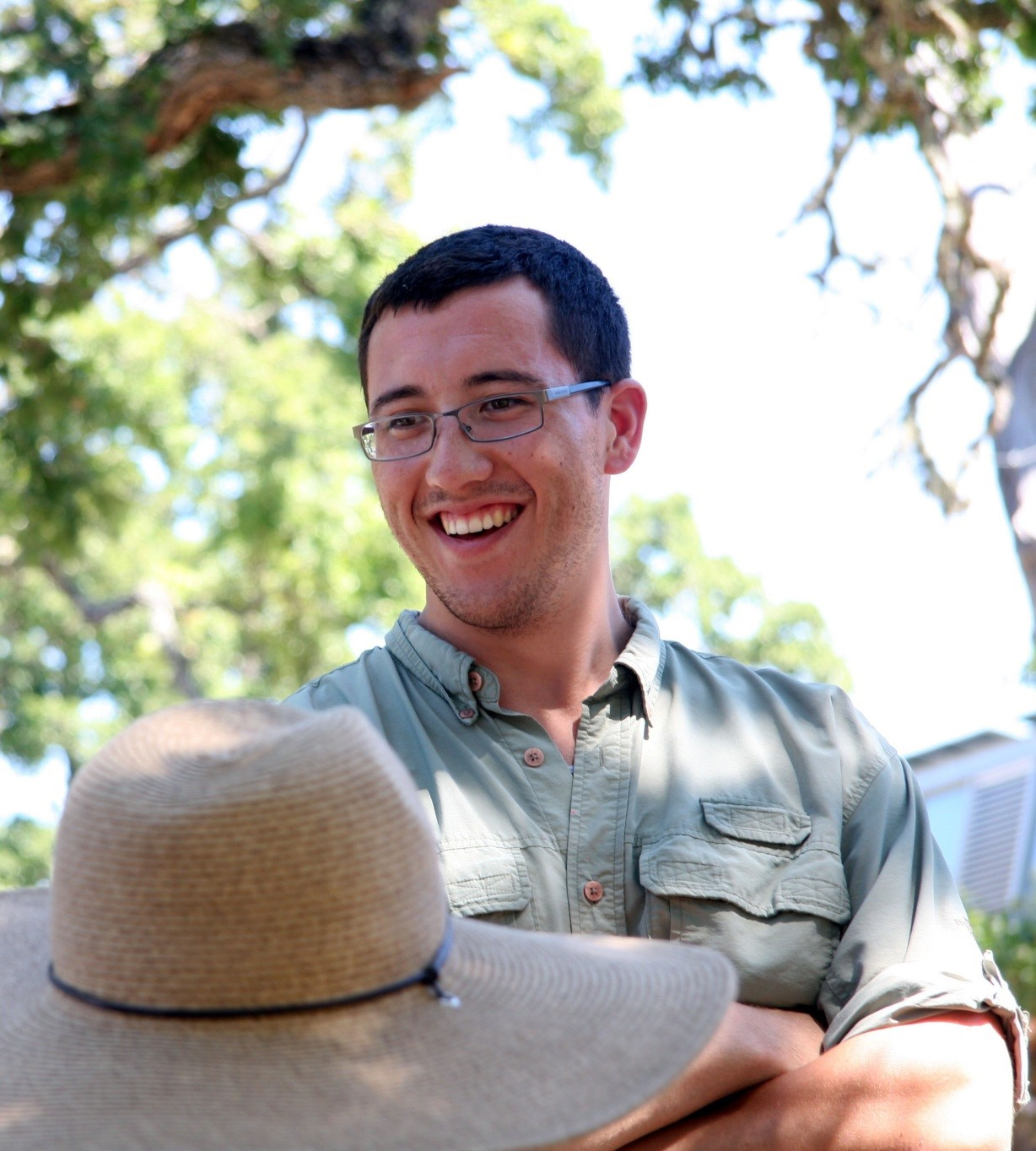 Koji Lau-Ozawa is a UCLA Chancellor’s Postdoctoral Fellow in the Institute of American Cultures. His research focuses on the archaeology of Japanese diaspora and their intersections with Indigenous lands as well as heritage practices around wartime memory. He received his PhD in Anthropology from Stanford University, MA from San Francisco State University, and undergraduate degree from the University of Edinburgh.
Koji Lau-Ozawa is a UCLA Chancellor’s Postdoctoral Fellow in the Institute of American Cultures. His research focuses on the archaeology of Japanese diaspora and their intersections with Indigenous lands as well as heritage practices around wartime memory. He received his PhD in Anthropology from Stanford University, MA from San Francisco State University, and undergraduate degree from the University of Edinburgh.
Contact Michelle Jacobson
Phone
The Cotsen Institute of Archaeology labs will be open to the public on November 14th, 2024 from 4:00pm to 6:00pm followed by a lecture by incoming faculty Dr. Koji Lau-Ozawa. His talk, titled Blossoms in the Desert: Japanese American Incarceration on Indigenous Lands, will take place in the Lenart Auditorium.
RSVP here or use the QR code below
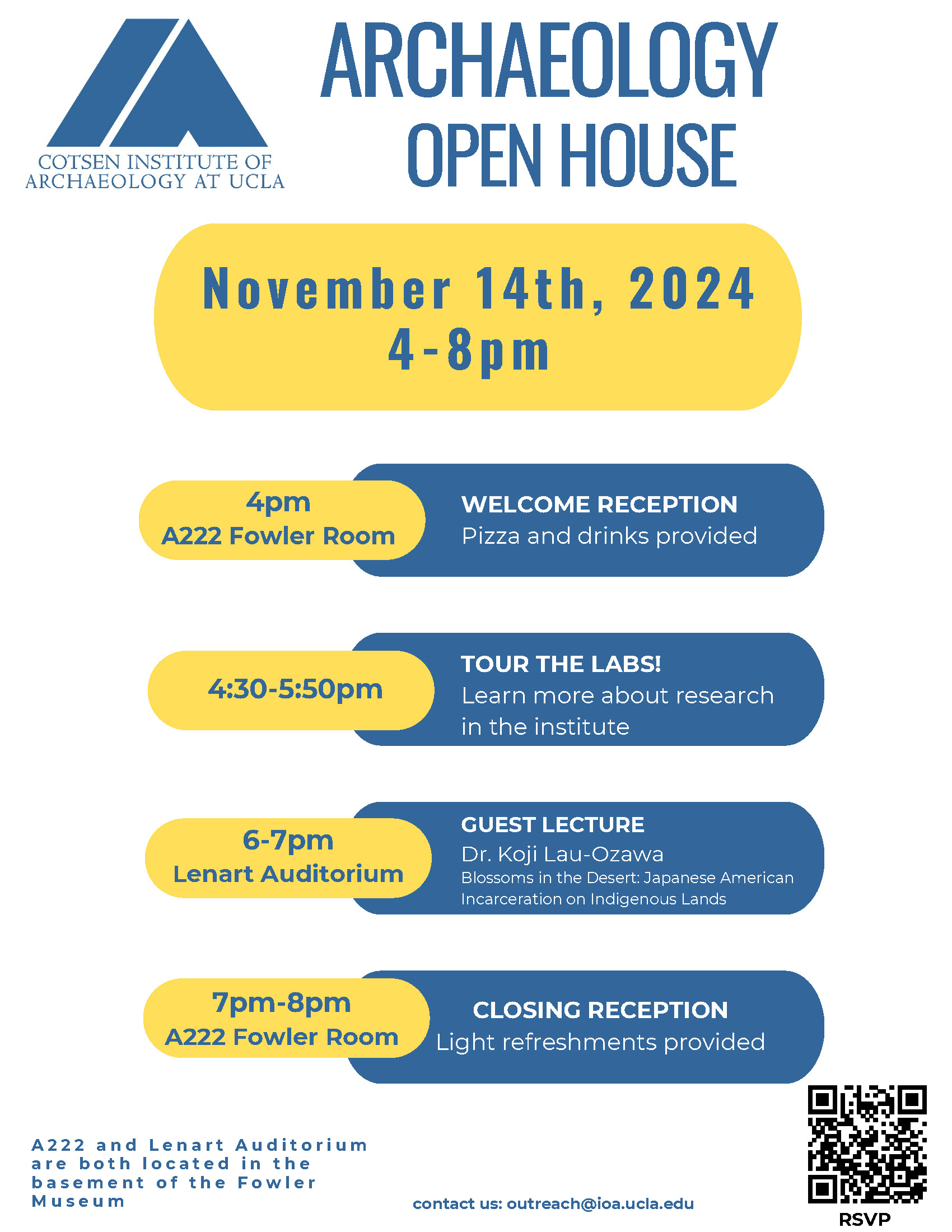
Contact Victoria Newhall
Phone
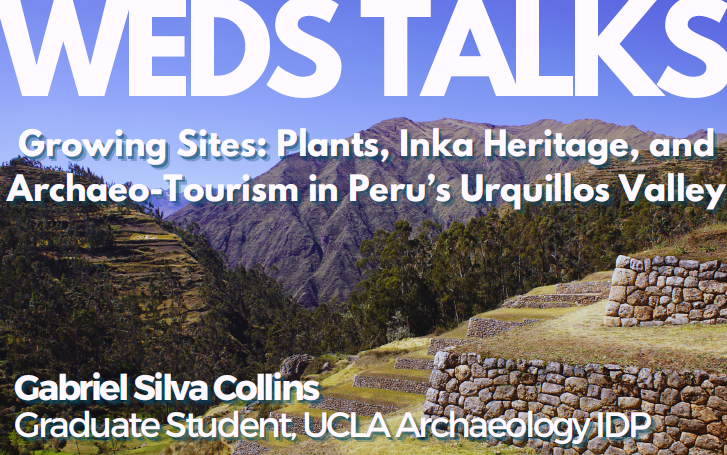
ABSTRACT: Southern Peru's Urquillos Valley hosts a series of Inka sites that exist in various states of integration with homes, farms, and the Peruvian tourist economy. Local Indigenous communities' ongoing use of these Inka sites frequently puts them at odds with the Peruvian government's Ministry of Culture, which often seeks to transform locally-managed "ruins" into state-run "archaeological sites." Examining three sites within the valley—Inkaq Mallquin, Apiypanki, and Choquekasantuy—reveals that different points in this transformative process can be linked to differences in plant communities living on those sites. Contemporary plants on heritage sites are both proxies for and drivers of archaeology-associated social, economic, and physical changes to the valley's Inka sites. In this talk, I study how botanical ecologies are employed by competing groups in struggles for control over land and heritage in the Urquillos Valley, and propose that a form of ecological imperialism is involved in creating proper archaeological sites as envisioned by Peru's Ministry of Culture.
BIO: Gabriel Silva Collins is a third-year PhD student at the Cotsen Institute of Archaeology. He received a BA in Anthropology from Williams College, and completed his MA in Archaeology at UCLA last spring. Gabriel's mixed archaeological and ethnographic research has focused on the relationships between precolonial Peruvian archaeological sites and the people who now live in, on, and around them. His dissertation work will continue these themes while examining a group of understudied sites near Cochabamba, Bolivia.
Contact Sumiji Takahashi
Email sutakahashi@ioa.ucla.edu
Phone 310-825-4169
On February 5, 2024, the Fowler returned a group of objects to His Majesty, Otumfuo Osei Tutu II, the 16th Asante King (Asantehene). On July 23, 2024, 20 historical treasures were returned to the Warumungu community in Tennant Creek, in the northern Territory of Australia. Join Silvia Forni, the Shirley & Ralph Shapiro Director of the Fowler Museum, and Erica P. Jones, senior curator of African arts and manager of curatorial affairs, for a conversation about the processes that enabled these returns and what museums gain when they let go of certain objects.
6pm Lecture
7pm Reception
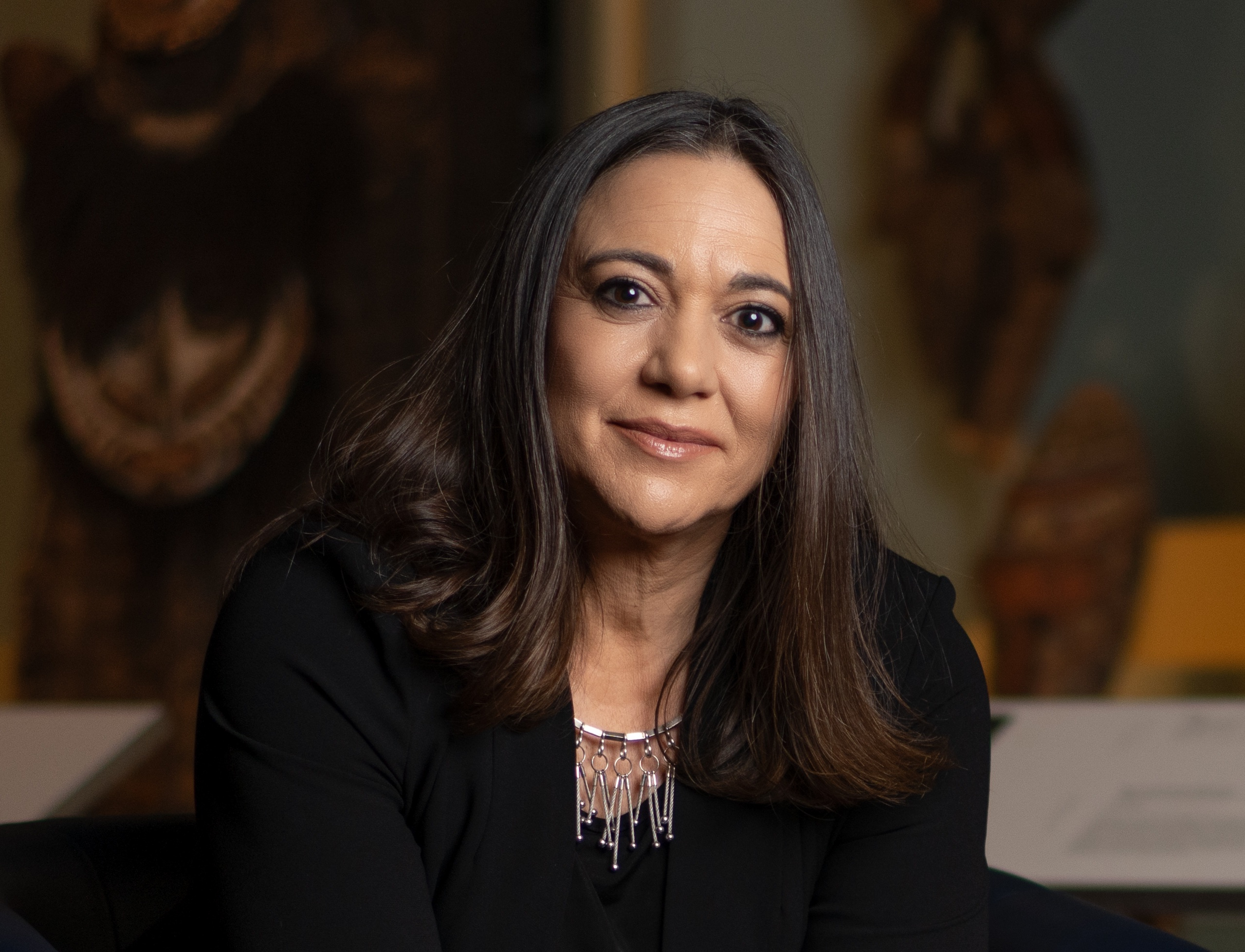 Dr. Silvia Forni joined the Fowler Museum as Shirley and Ralph Shapiro Director in December 2022. At the Fowler she is leading a team of dedicated scholars and museum professionals deeply invested in celebrating underrepresented artists and art histories and curating exhibitions and programs with and for the global communities of greater Los Angeles. Before moving to LA she served as Senior Curator of Global Africa and Deputy Vice President of the Department of Art & Culture at the Royal Ontario Museum in Toronto. She is also associated with the Department of Anthropology of the University of Toronto as Associate Professor. She is the author of numerous essays and book chapters. Among her recent publications is the volume Making History: Visual Art & Blackness in Canada, co-edited with Julie Crooks and Dominique Fontaine (2023), Art, Honor, and Ridicule: Fante Asafo Flags from Southern Ghana (2017), co-authored with Doran H. Ross (Awarded the R.L. Shep Ethnic Textile Book Award from the textile Society of America in 2018) and Africa in the Market. 20th Century art from the Amrad African Art Collection. (2015) edited with Christopher B. Steiner (Awarded the Arnold Rubin Outstanding Publication Award from the Art Council of the African Studies Association in 2017).
Dr. Silvia Forni joined the Fowler Museum as Shirley and Ralph Shapiro Director in December 2022. At the Fowler she is leading a team of dedicated scholars and museum professionals deeply invested in celebrating underrepresented artists and art histories and curating exhibitions and programs with and for the global communities of greater Los Angeles. Before moving to LA she served as Senior Curator of Global Africa and Deputy Vice President of the Department of Art & Culture at the Royal Ontario Museum in Toronto. She is also associated with the Department of Anthropology of the University of Toronto as Associate Professor. She is the author of numerous essays and book chapters. Among her recent publications is the volume Making History: Visual Art & Blackness in Canada, co-edited with Julie Crooks and Dominique Fontaine (2023), Art, Honor, and Ridicule: Fante Asafo Flags from Southern Ghana (2017), co-authored with Doran H. Ross (Awarded the R.L. Shep Ethnic Textile Book Award from the textile Society of America in 2018) and Africa in the Market. 20th Century art from the Amrad African Art Collection. (2015) edited with Christopher B. Steiner (Awarded the Arnold Rubin Outstanding Publication Award from the Art Council of the African Studies Association in 2017).
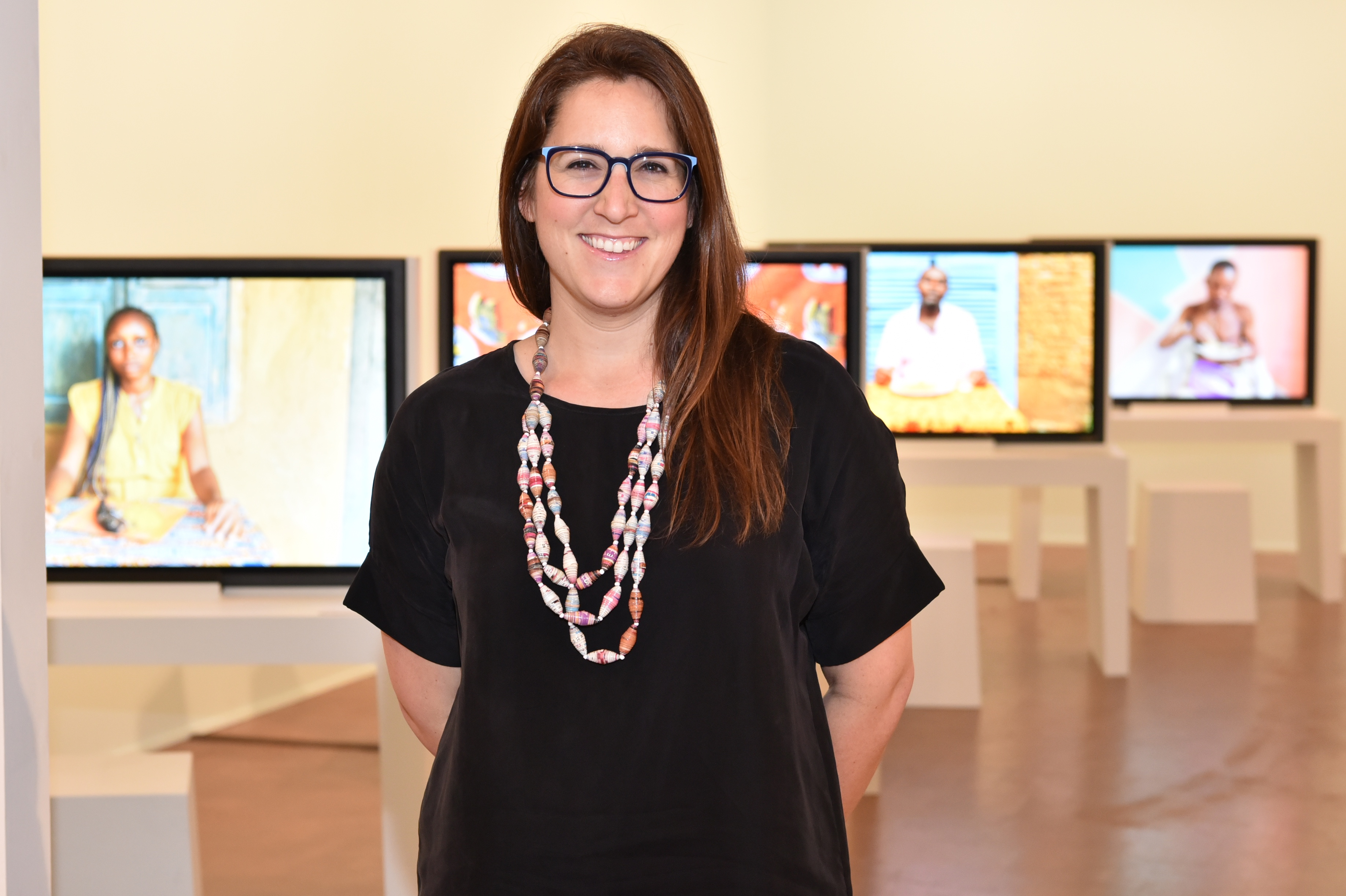 Dr. Erica P. Jones is the Senior Curator of African Arts and Manager of Curatorial Affairs at the Fowler Museum at UCLA. She received a Ph.D. in art history, with a focus in the arts of Africa, from the University of California, Los Angeles. Since joining the Fowler Museum in 2015, she has curated many exhibitions. A selection include The House Was Too Small: Yoruba Sacred Arts from Africa and Beyond (2023, co-curator), Gosette Lubondo: Imaginary Trip (2022, co-curator), Photo Cameroon: Studio Portraiture 1970-90s (2021, co-curator), Inheritance: Recent Video Art from Africa (2019), On Display in the Walled City: The Nigerian Pavilion at the British Empire Exhibition 1924-1925 (2019), and Meleko Mokgosi: Bread, Butter, and Power (2018). Jones is a key member in the Fowler’s Mellon grant funded initiative “Collaborative Interdisciplinary Research on African Collections at the Fowler Museum.” She is currently on the board of African Arts Journal, serves as a co-chair of the steering committee for the Collaboration, Collections, and Restitution Best Practices for North American Museums Holding African Objects Working Group, and in 2024 led the Fowler Museum’s repatriation of seven looted objects to the Asante Kingdom in Ghana. Her publishing has been concentrated on colonial-era collecting, provenance, and the arts and museums of the Cameroon Grassfields. She is the author of the book accompanying the exhibition Bread, Butter, and Power.
Dr. Erica P. Jones is the Senior Curator of African Arts and Manager of Curatorial Affairs at the Fowler Museum at UCLA. She received a Ph.D. in art history, with a focus in the arts of Africa, from the University of California, Los Angeles. Since joining the Fowler Museum in 2015, she has curated many exhibitions. A selection include The House Was Too Small: Yoruba Sacred Arts from Africa and Beyond (2023, co-curator), Gosette Lubondo: Imaginary Trip (2022, co-curator), Photo Cameroon: Studio Portraiture 1970-90s (2021, co-curator), Inheritance: Recent Video Art from Africa (2019), On Display in the Walled City: The Nigerian Pavilion at the British Empire Exhibition 1924-1925 (2019), and Meleko Mokgosi: Bread, Butter, and Power (2018). Jones is a key member in the Fowler’s Mellon grant funded initiative “Collaborative Interdisciplinary Research on African Collections at the Fowler Museum.” She is currently on the board of African Arts Journal, serves as a co-chair of the steering committee for the Collaboration, Collections, and Restitution Best Practices for North American Museums Holding African Objects Working Group, and in 2024 led the Fowler Museum’s repatriation of seven looted objects to the Asante Kingdom in Ghana. Her publishing has been concentrated on colonial-era collecting, provenance, and the arts and museums of the Cameroon Grassfields. She is the author of the book accompanying the exhibition Bread, Butter, and Power.
Contact Michelle Jacobson
Email mjacobson@ioa.ucla.edu
Phone
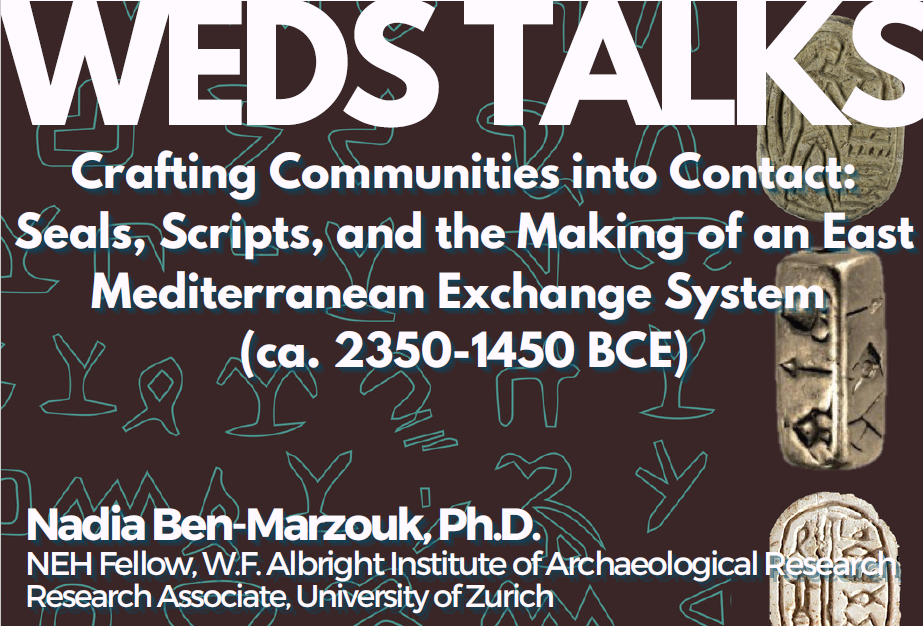
ABSTRACT: The late third to early second millennium BCE is characterized by the unprecedented movement of goods, people, and ideas alongside the development and spread of shared social practices and innovations in the east Mediterranean. It’s against this backdrop that we see the widespread appearance of emergent writing systems with (semi-)pictographic scripts and so-called “pseudo scripts”, many of which share similar graphemes and almost all of which appear on stamp seal amulets. Traditional scholarship has sought to understand the extent to which the Egyptian writing system impacted on local script formation, limiting stimuli to writing practices from one geographic region. This talk takes a craft-centered interregional approach, evaluating these scripts in relation to one another and proposing they evolved, in part, alongside a shared visual language reflecting a common repertoire of symbols and practices marking membership in a transregional community of exchange.
BIO: Nadia is currently an NEH Fellow at the W.F. Albright Institute of Archaeological Research and a research associate at the University of Zurich. She was a postdoctoral researcher on the Swiss National Science Foundation funded Sinergia project, “Stamp Seals from the Southern Levant” (2021–2023) after receiving her Ph.D. in Levantine Archaeology from the University of California, Los Angeles. Her research examines craft production in the Bronze Age eastern Mediterranean, with a focus on the identities and embodied knowledge of producers and the contexts in which innovations arose. Nadia has co-edited several volumes including Ancient Egyptian Society (2022, Routledge), two special issues of Near Eastern Archaeology (2023–2024), and two edited volumes on stamp seal production and typology (forthcoming, Peeters). She is currently working on a Cambridge University Press Element titled Social Identity in Ancient Egypt, as well as a book exploring the role of craftspeople in the making of an east Mediterranean exchange system.
Contact Sumiji Takahashi
Email sutakahashi@ioa.ucla.edu
Phone 310-825-4169
Archaeologies of Forced Migration:
Approaches, Case Studies, and Prospects
Cotsen Advanced Seminar, Cotsen Institute of Archaeology, UCLA
October 24–26, 2024
Organized by
Aaron A. Burke, Near Eastern Languages and Cultures
Li Min, Anthropology/East Asian Languages and Cultures
The symposium will be held over three days from the evening of Oct. 24th through Oct. 26th. Attendees are encouraged, though not required, to register for the event if they would attend any part of it, in order that we can maintain a record of attendees and communicate promptly in the event of any program changes. Please use the QR code or this link to do so.
The program has been made possible with generous support from UCLA’s Dean of Humanities, the Global Antiquity initiative, the Kershaw Chair of Ancient Eastern Mediterranean Studies, and the Department of Near Eastern Languages and Cultures.
![]() Cotsen Advanced Seminar - Forced Migration (2024-10).pdf
Cotsen Advanced Seminar - Forced Migration (2024-10).pdf
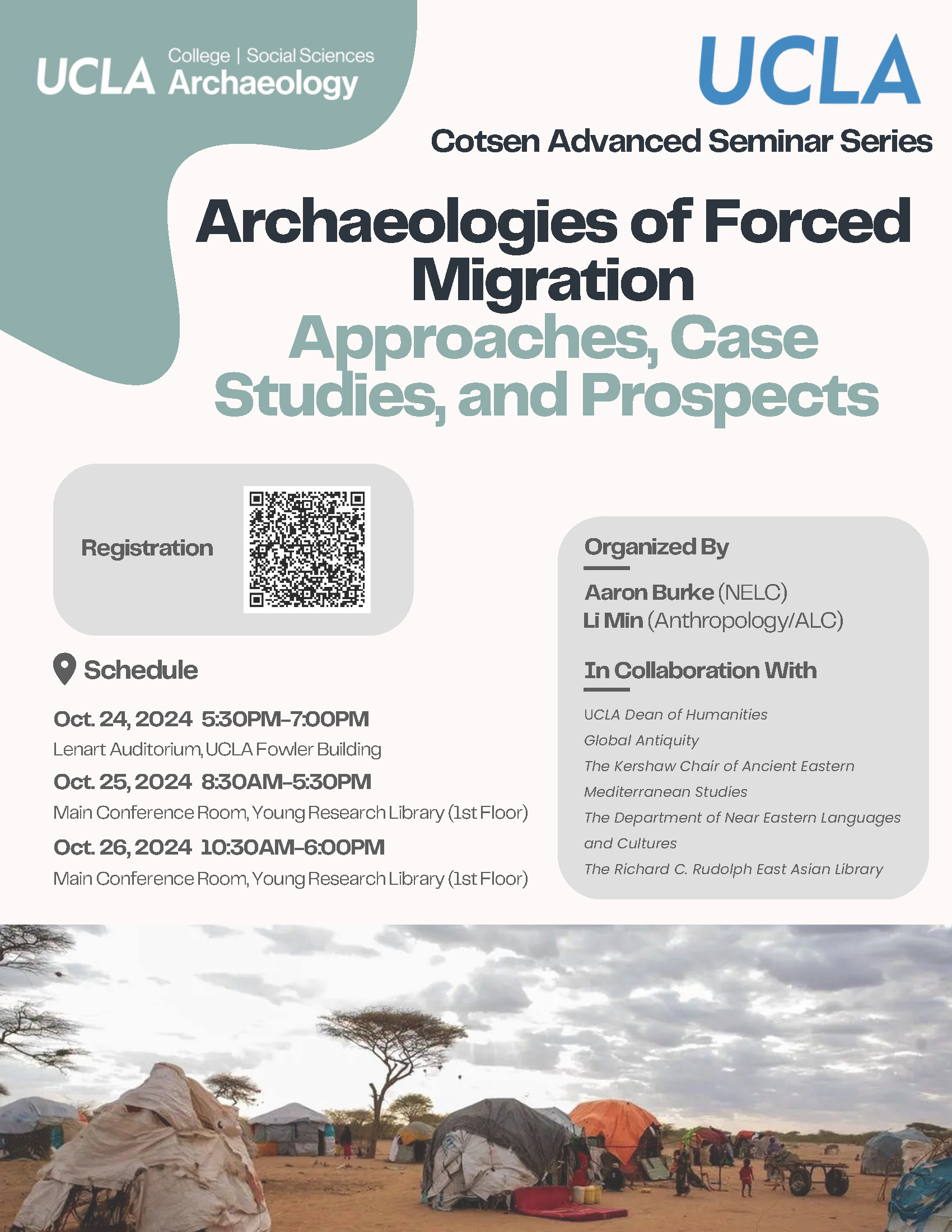
Contact
Phone
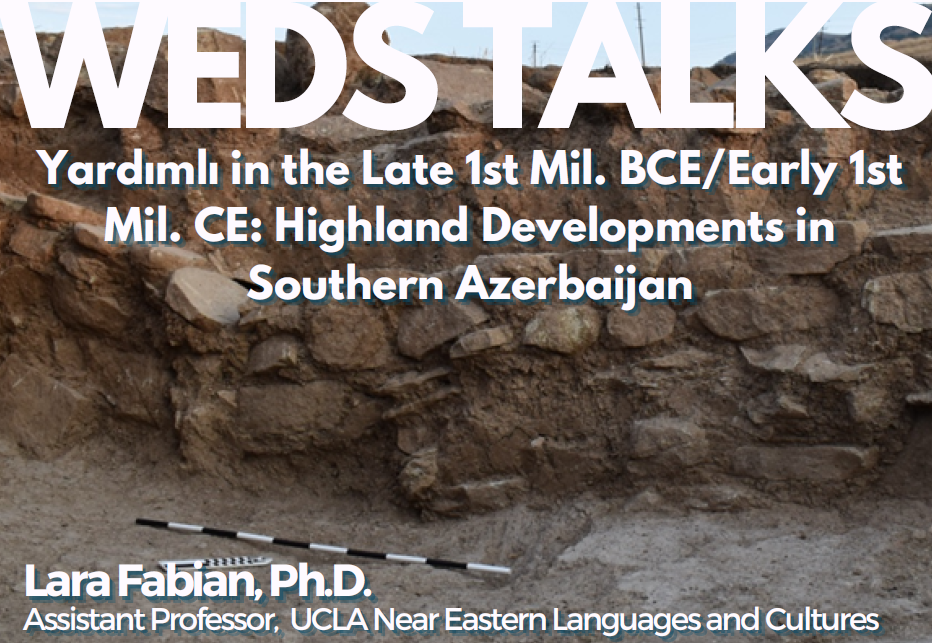
ABSTRACT: Highland landscapes present both conceptual and practical challenges for archaeology and archaeologists, and remain both understudied and undertheorized. In this talk, I will discuss those issues and how they have informed fieldwork that I and my collaborators (Hannah Lau and Jeyhun Eminli) have been conducting in the Talış Mountains in recent years. This highland zone, which is part of the Alborz range, is a unique ecosystem at the southern limits of the Caspian Sea. I will highlight results of fieldwork from our 2024 season of SHARP (the Southeastern Highlands Archaeological Research Project) in the Yardımlı district of Azerbaijan, where we have begun to expose a surprisingly landscape of large-scale stone-built architecture dating to the late 1st millennium BCE, providing entirely new datapoints for our understanding of post-Achaemenid developments in this region.
BIO: Lara Fabian is an assistant professor of Iranian archaeology in the department of Near Eastern Languages and Cultures at UCLA whose work focuses on Iran and the Caucasus, and broader Southwest Asia, in the Iron Age and later. Her current book project considers the material imprint of empire in its afterlife through an examination of the post-Achaemenid world. Her scholarship is informed by historiographic and reception studies on the development of thought about antiquity and the question of Iran in the Russian Empire, Soviet Union, and post-Soviet Eurasia. As part of this wider research, she has co-directed collaborative Azerbaijani-American fieldwork in Azerbaijan since 2016. Before coming to UCLA, she worked on the “Beyond the Silk Road” ERC project at Albert-Ludwigs-Universität Freiburg.
Contact Sumiji Takahashi
Email sutakahashi@ioa.ucla.edu
Phone 310-825-4169
Excavations at Tell Umm el-Marra (perhaps ancient Tuba) in northern Syria revealed a large Early Bronze Age elite mortuary complex raised up in the center of the community. In this complex, tombs with human remains and objects of gold, silver, and lapis lazuli were accompanied by the burials of high-prestige animals (donkey x wild ass hybrids, known as kungas). Unique in the archaeology of third-millennium BC Syria, the Umm el-Marra necropolis allows for the reconstruction of elite funerary practices in detail and illuminates the importance of ancestor veneration, social memory, and animal agency in the development of Syria’s first urban civilization.
6pm Lecture
7pm Reception
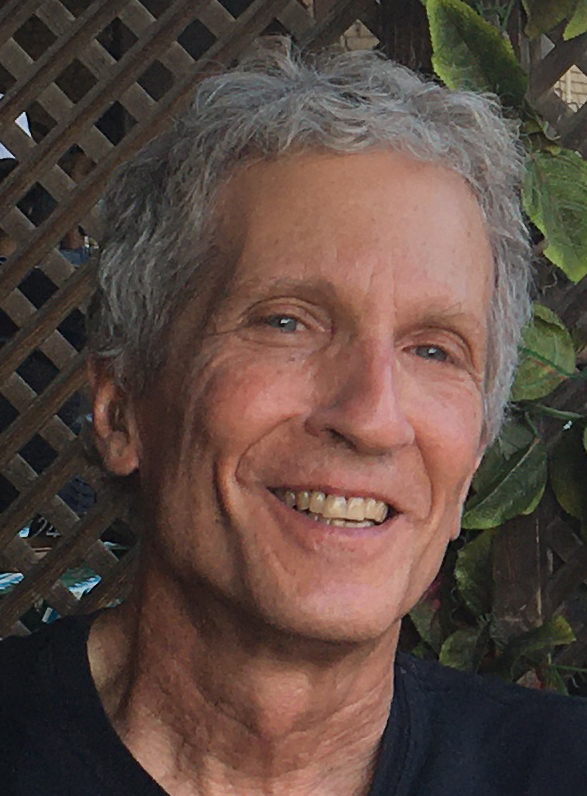
Glenn M. Schwartz is Whiting Professor of Archaeology, Department of Near Eastern Studies, Johns Hopkins University. He is a Near Eastern archaeologist who has directed excavations in Syria and Iraq and conducts research on the emergence and early trajectory of complex societies. Schwartz received his PhD from Yale University in 1982.
Schwartz’s field project at Tell Umm el-Marra, western Syria, included a focus on an elite necropolis from the Early Bronze Age with well-preserved tombs and evidence of ritual and sacrificial installations. His previous excavation project was based at Tell al-Raqa'i in northeastern Syria, investigating the character of a small village in the period of urban formation. Schwartz’s most recent fieldwork project has been based at the second-millennium BC urban Bronze Age site of Kurd Qaburstan south of Erbil in the Kurdistan region of Iraq. Among his publications are The Archaeology of Syria: From Complex Hunter-Gatherers to Urban Societies, ca. 16,000-300 BC (Cambridge University Press, 2003), coauthored with Peter Akkermans, Rural Archaeology in Early Urban Northern Mesopotamia: Excavations at Tell al-Raqa’i (Cotsen Institute of Archaeology Press, 2015), and After Collapse: The Regeneration of Complex Societies(University of Arizona Press, 2006), coedited with John Nichols.
Contact Michelle Jacobson
Email mjacobson@ioa.ucla.edu
Phone
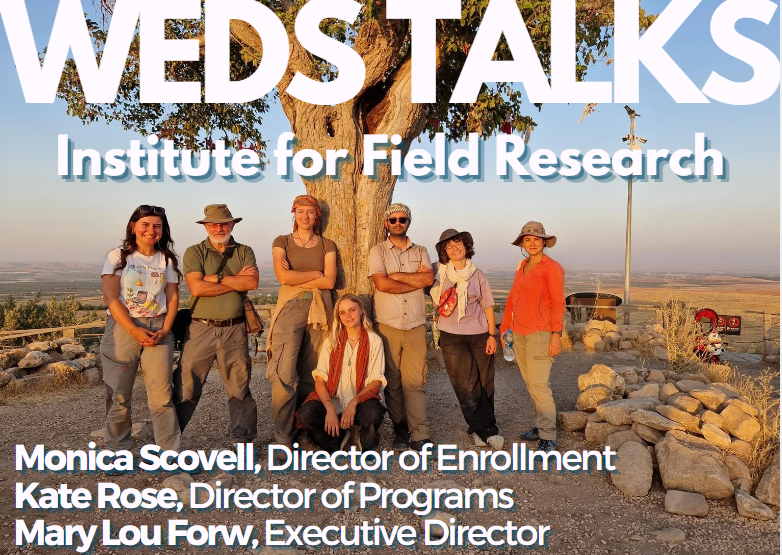
ABSTRACT: Are you thinking about a field school this summer or next year? Come learn about the unique programs offered through IFR, the Institute for Field Research. UCLA students who previously completed a program will be there to share their experiences, and we'll have time to answer any questions you might have about field schools for us or your peers. IFR programs allow you to embrace your curiosity while earning academic credit and gaining practical hands-on experience for future work or studies. We will also share information about a scholarship just for LA students attending our field schools.
BIO: The Institute for Field Research (IFR) is a faculty-founded non-profit that supports field schools in the USA and abroad in a range of disciplines including archaeology, anthropology, curation, and earth/enviro studies. The IFR’s mission is to transform individuals and communities through experiential education and field research. By working with leading scholars from academic institutions around the world, the IFR delivers evidence-based field science programs in a broad range of disciplines while ensuring excellence in research and teaching.
Contact Sumiji Takahashi
Email sutakahashi@ioa.ucla.edu
Phone 310-825-4169
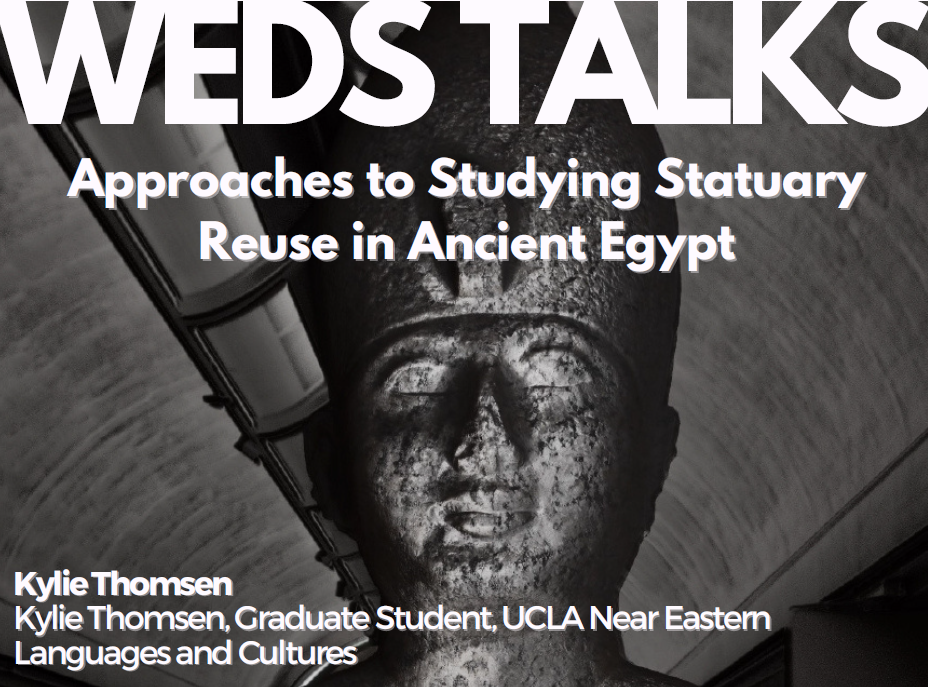
ABSTACT: Statuary reuse was an episodic practice in ancient Egypt. Reuse of a statue could range from actions not obvious in the archaeological record, such as moving a statue to a secondary location by a different owner, to the transformation of a statue by modifying its inscriptions, reworking its features, or even the destruction of a larger statue to craft several smaller ones. However, depending on the extent to which the object was modified and its overall preservation, it remains difficult to systematically study, particularly over time and space. This presentation will focus on approaches to identifying the actions associated with statuary reuse in order to better analyze the object’s life history through the modifications it underwent. Through this, I aim to contribute to the understanding of the intent(s), context(s), and reception(s) of statuary reuse in ancient Egypt, as well as the technical strategies employed by the ancient craftspeople who altered these objects for their later uses.
BIO: Kylie is an Egyptology PhD candidate in the Department of Near Eastern Languages and Cultures at the University of California, Los Angeles. She received her BA in anthropology from the University of Arizona and her MA in Egyptology from Indiana University Bloomington. She is currently a researcher and graphic designer for the UCLA Coffins Project, which investigates coffin reuse in ancient Egypt during the Third Intermediate Period. Her dissertation research focuses on the documentation and contextualization of ancient Egyptian statuary reuse, including documenting statues via high-resolution photography, photogrammetry, RTI (reflectance transformation imaging), and traditional art historical methods in order to analyze the statues for signs of recarving, reinscribing, and other indicators of object reuse.
Contact Sumiji Takahashi
Email sutakahashi@ioa.ucla.edu
Phone 310-825-4169
- ‹ previous
- 6 of 51
- next ›


